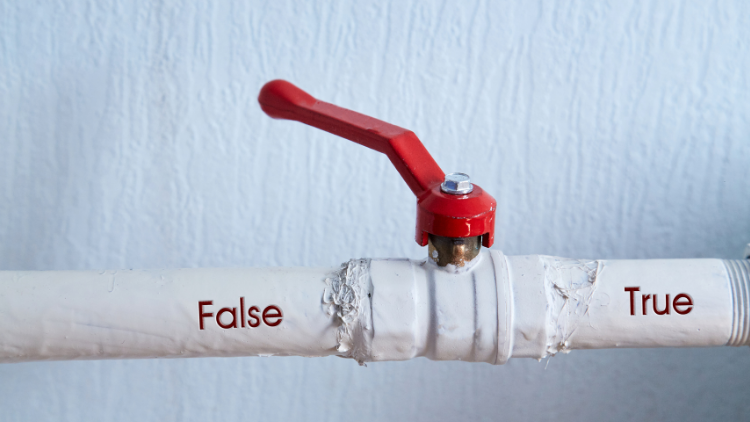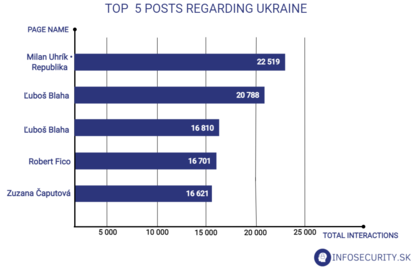DISINFORMATION
Disinformation about alleged Ukrainian nuclear and biological weapons dominate the narratives of pro-Kremlin media

While Russia is attacking Ukraine on land, sea, and air, a battle is also being fought in the information space. The pro-Kremlin actors are actively trying to justify Putin's aggression by flooding the Slovak information space with a plethora of disinform
Infosecurity.sk presents an overview of disinformation trends that have been on the rise in information space in the past two weeks:
- In an attempt to justify Putin's actions, disinformation actors repeat the official Kremlin narrative of "denazification" and "liberation" of Ukraine. These official claims are coupled with recycled narratives that Ukraine is an unstable country being used by the West as a proxy to destroy Russia.
- New disinformation narratives have emerged about alleged Ukrainian plans to use nuclear or biological weapons.
- Disinformation actors also spread narratives designed to undermine the public's confidence in the sanctions imposed on Russia and the Slovak government's retaliatory actions. These narratives are paired with recycled energy-related disinformation.
- The goal of the disinformation campaign remains unchanged: to demonize the West and portray Russia as the ultimate victim, forced to invade to protect its national security.
Reiterating the lazy pretext
President Putin tries to justify his war against Ukraine as a special operation aimed at "denazifying" Ukraine and putting an end to an alleged "genocide" there. According to the official narrative, the victims of the imaginary genocide are supposed to be the Russian-speaking population in Ukraine; the "Nazis and drug addicts" are the Ukrainian government led by President Zelensky.
The pretext for the invasion is even more absurd when one considers that Zelensky has Jewish roots and is the grandson of a Holocaust survivor. Moreover, the Russian minority living in democratic Ukraine enjoyed much more freedom than in Russia, where Putin's authoritarian government has for years violently repressed any political dissent.
As absurd as the official pretext for the invasion is, Putin's claims continue to be spread by Slovak disinformation actors. These are largely coupled with older, recycled narratives which claim that Ukraine is an unstable country run by oligarchs/foreign agents and is used by the EU/NATO/US as a proxy to destroy Russia. The goal of the disinformation campaign remains unchanged: to demonize the West and portray Russia as the ultimate victim that had no choice but to invade Ukraine with a goal to protect itself.
However, since most of the free world along with Slovakia has unilaterally condemned the aggression, and opinion polls show that the majority of the Slovak population supports the condemnation, these recycled narratives are apparently not enough to justify the war in the eyes of the Slovak public.
Frantically searching for a new justification
Since Putin's justification of the war as a fight against "Nazis and drug addicts" is apparently not sufficient, the pro-Kremlin disinformation channels are now spreading even more ridiculous narratives by claiming that Ukraine possesses weapons of mass destruction (WMD), apparently in the hope that this will help justify Putin's actions.
One such narrative states that Ukraine has been secretly developing nuclear weapons. According to this disinformation narrative, Ukraine could have acquired nuclear weapons within a few months, as a source within a Russian state security agency apparently told Russian state media.
This narrative was also reiterated by Foreign Minister Sergey Lavrov, who made completely unsubstantiated claims during a disarmament meeting in Geneva where he stated that Ukraine intended to acquire nuclear weapons, even though Ukraine never deviated from its commitments under the Budapest Memorandum.
Another prominent WMD narrative is that Ukraine has been experimenting with and producing biological weapons. As an alleged proof, the Kremlin has published documents with instructions for the destruction of pathogenic microorganisms and certificates of compliance. According to Moscow, the documents come from the Ukrainian Ministry of Health.
The Russian propaganda claims that this can be considered an attempt by Kiev to cover its tracks. The Ukrainian Foreign Ministry dismissed the reports as disinformation and blunt provocation. It is unclear at this time whether the documents released by the Kremlin are forged or authentic. However, even if they are genuine, they contain no evidence that Ukraine was experimenting with or manufacturing WMDs. The microorganisms in question are ordinary strains of bacteria, and none of them are considered potential biological weapons.
Moreover, the very existence of biological research centres on the territory of Ukraine is not a secret. Information about the laboratories is freely available and they are by no means centres for the production of biological weapons.
Despite their unfounded basis, these narratives quickly reached Slovakia, where they were spread by pro-Russian leaning MPs, various disinformation pages on Facebook as well as leading disinformation websites such as Infovojna and Hlavný denník (before the latter was blocked by the National Security Bureau).
However, the Kremlin's accusations are not a novelty. Similar narratives have surfaced since before the invasion, and Moscow has previously used the same disinformation tactics in Georgia.
Undermining the response
Finally, the disinformation actors produce narratives designed to undermine public confidence in the sanctions imposed on Russia and the retaliatory measures taken by the Slovak government.
Several disinformation blogs along with the aforementioned pro-Russian MPs disseminate disaster scenarios that the sanctions imposed by the EU against Russia will inevitably lead to catastrophic price increases and shortages of basic commodities.
These narratives are paired with recycled energy-related disinformation claiming that the EU is forcibly imposing its Green Deal on member states and that renewable energy sources cannot possibly meet the needs of them. Therefore, any attempt to diversify energy sources and move away from Russia as the sole energy supplier is automatically demonized.
As Slovakia is also one of the countries that has donated military equipment in addition to humanitarian aid to Ukraine, certain disinformation narratives claim that Slovakia is becoming a party to the conflict and a potential target because of its membership in NATO. These narratives attempt to undermine Slovakia's membership in Euro-Atlantic structures by claiming that the country would be much safer if it remained neutral.
The Slovak disinformation scene has taken several blows since the invasion began, as the National Security Bureau blocked some of the country's leading disinformation websites, such as Hlavné správy and Hlavný denník, in an effort to impede the flow of Russian pro-war disinformation.
Still, this had little impact on the spread of pro-Russian disinformation on social media. As data from Crowdtangle[1] show, the main disseminators of pro-Russian disinformation on Facebook are some of the opposition MPs.

The graph above shows the top Facebook posts about Ukraine, ranked by total number of interactions (likes, comments, and shares). The posts that received the most interactions in the last two weeks were published by the country's opposition MPs (Ľuboš Blaha and Robert Fico) and an MEP (Milan Uhrík) and, with the exception of President Zuzana Čaputová's post, contain at least one of the disinformation narratives described in this article. The data was obtained by searching for the keyword: ukrajina.
[1] CrowdTangle is a monitoring tool made available by Facebook to help monitor, analyse, and report on what’s happening across the platform. https://www.crowdtangle.com
Project Infosecurity.sk organised by STRATPOL – Strategic Policy Institute and Slovak Security Policy Institute, which is supported by the Prague office of the Friedrich Naumann Foundation for Freedom, continuously monitors the activities of both Slovak and foreign disinformation actors, but focuses mainly on the former. The project activities are built upon daily monitoring of emerging disinformation, hoaxes, and conspiracy theories in the online information space. This approach allows the analysts to identify disinformation posts and narratives that resonated with the public the most, as well as to find out where they originated, and how they spread and evolved on social media. The report takes the form of a bi-weekly summary of arising trends in the spread of malicious information content online. Based on that, Infosecurity.sk can warn the public about emerging and current trends in the field of disinformation, manipulation, and propaganda.
Matej Spišák is a Research Fellow at STRATPOL – Strategic Policy Institute in Bratislava and Editor-in-Chief at Infosecurity.sk.
Denis Takács is an Analyst at STRATPOL – Strategic Policy Institute in Bratislava.

